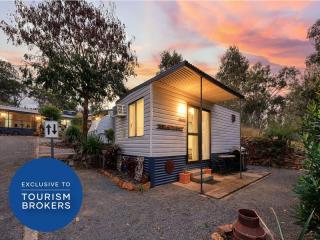Investing in the hospitality industry can be a lucrative and rewarding venture, and buying a motel is a popular choice for many investors.
If you're considering entering the world of motels, this article will provide you with valuable tips for buying motels, key factors to consider, and a comprehensive understanding of the benefits and challenges associated with this industry. So, let's embark on this journey together and unlock the secrets of motel investment.
6 Essential Tips for Buying Motels
-
Location, Location, Location: Consider the location of the motel you're planning to buy. A motel in a popular tourist destination or a business hub will likely have a higher occupancy rate than one in a remote area. Keep in mind that the location will also impact the property's resale value.
-
Financial Performance: Scrutinize the financial records of the motel to ensure it has a strong track record of profitability. Pay special attention to revenue, occupancy rates, and expenses. A well-performing motel will likely provide a solid return on your investment.
-
Property Condition: Inspect the motel's physical condition and evaluate the cost of any necessary repairs or renovations. A well-maintained property can save you money in the long run and provide a more comfortable environment for your guests.
-
Management Structure: Decide whether you want to manage the motel yourself or hire a management team. Running a motel can be time-consuming, so if you're not prepared to dedicate the necessary time and effort, consider employing a professional team to oversee daily operations.
-
Market Trends: Research the local market and stay up-to-date with industry trends. Understanding the competition and potential growth opportunities in your area will help you make informed decisions about your investment.
-
Legal and Regulatory Compliance: Ensure the motel complies with all relevant local, state, and federal laws and regulations. Seek professional advice to navigate the complexities of zoning, licensing, and other legal requirements.
In conclusion, investing in a motel can be a lucrative and fulfilling endeavor when approached with the right information and guidance. By considering the various aspects of the business, including location, condition, tenure, and online reviews, you can make an informed decision that suits your financial, lifestyle, and family requirements. Remember to conduct thorough due diligence, seek financing from a reputable source, and enlist the services of industry experts for a seamless transaction. Armed with these top tips for buying motels, you're now ready to embark on your journey in the accommodation industry and achieve both personal and professional success.
Quick Links: motel for sale motel for sale broker
Frequently Asked Questions (FAQs)
What are the main differences between leasehold and freehold motels?
Leasehold motels involve the investor owning the business but leasing the property, whereas freehold motels involve owning both the business and the property. The decision between leasehold and freehold depends on factors such as budget, investment goals, and the desired level of control over the property.
How important are online reviews when buying a motel?
While online reviews can provide insight into the guest experience at a motel, it's essential not to rely solely on them. Consider conducting your research and visiting the property in person to form an unbiased opinion.
What is due diligence, and why is it important when buying a motel?
Due diligence is the process of thoroughly investigating a business before making a purchase. It helps potential buyers verify the accuracy of financial statements, legal compliance, and other crucial factors to ensure they're making a sound investment.
What kind of financing options are available for purchasing a motel?
Several financing options are available, including bank loans, seller financing, and Small Business Administration (SBA) loans. It's essential to consult with a financial expert specializing in motel financing to determine the best option for your situation.


















